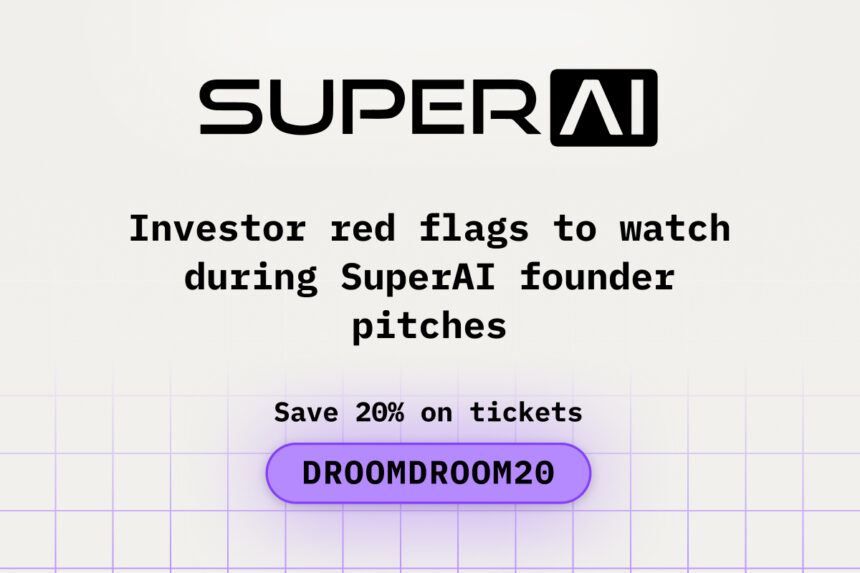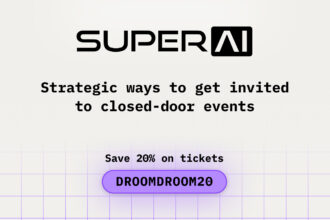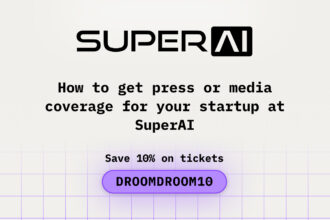SuperAI is an exciting arena for founders: attention from VCs, demo floors, pitch competitions, and a global stage. But among the energy and opportunity, some pitches instantly trigger warning signs for investors. Founders who understand what red flags turn off investors can refine their presentation, build trust, and improve the odds of success. Below are common red flags investors watch for, illustrated with insights applicable during SuperAI founder pitches.
- Vague Problem Statement or Overly Broad Claims
- Unrealistic Financial Projections and Hype-Heavy Models
- Ignoring the Competitive Landscape and No Differentiation
- Weak Business Model or Go-to-Market Strategy
- Weak or Unbalanced Team Composition
- Poor Data & Metrics Transparency
- Overreliance on Buzzwords and Technical Jargon
- Defensive or Evasive Communication
- Conclusion
Use DROOMDROOM20, the official SUPERAI promo code, to get 20% off ticket prices.
Vague Problem Statement or Overly Broad Claims
One of the first things investors judge is clarity. If a founder begins by describing a “big” problem without specificity—for example, “we solve global communication challenges” without defining who is suffering, where, and why—that’s a red flag. Pitches lacking firm context or use cases suggest superficial understanding. Investors in multiple resources note that vagueness kills attention quickly. Founders at SuperAI should define the problem with concrete examples: geography, user type, existing pain, etc.
Claim your 20% discount on SUPERAI tickets by entering the official promo code DROOMDROOM20.
Unrealistic Financial Projections and Hype-Heavy Models
Many investors cringe at forecasts that seem too good to be true—projected rapid revenue growth, overly optimistic user acquisition curves, or assumptions that omit key costs. Red flags include “perfect slope” growth without seasonality, no customer acquisition cost (CAC) analysis, and no path to profitability or sustainable burn. During SuperAI panels and interviews, founders who transparently show both base-case and downside scenarios tend to gain more credibility. Investors expect reasonable forecasts grounded in data.
Use the official SUPERAI promo code DROOMDROOM20 now and save 20% on your ticket.
Ignoring the Competitive Landscape and No Differentiation
Another major red flag is stating “we have no competition” or “competitors don’t matter.” If you can’t name your competition—direct or indirect—or explain how your product is distinct, investors assume you haven’t done your homework. Founders at SuperAI need to articulate their unique differentiators: technology, business model, customer reach, IP, or execution speed. Pitches that gloss over differentiation often end in underwhelming investment interest.
Weak Business Model or Go-to-Market Strategy
Even the most beautiful demo or clever technology won’t persuade if there’s no clear plan to monetize, scale, or reach customers. Investors look for defined revenue streams, realistic customer acquisition channels, understanding of lifetime value (LTV) vs CAC, and validated pilots or traction. Founders who show no estimation of how they’ll sell, distribute, or support users provoke serious concern. During SuperAI founder pitches, panels frequently raise the question: “How do you plan to get this into customers’ hands?”
Save 20% on SUPERAI tickets today with the official SUPERAI promo code DROOMDROOM20.
Weak or Unbalanced Team Composition
Investors invest in teams as much as ideas. Common red flags include missing key technical leadership, overpromising features that the current team can’t build, founders lacking execution experience, or poorly defined roles. Disagreements among co-founders, or lack of complementary skills (e.g. business + technical), also catch investor attention. Founders should ensure their team slides show both domain and execution strength, and ideally evidence of past successes or relevant experience.
Poor Data & Metrics Transparency
Founders who avoid showing real data—or present metrics without context—raise red flags. Metrics like user retention, engagement, growth rates need to be backed by real usage, not vanity metrics. Similarly, financials without unit economics (LTV, CAC, burn rate) make forecasting feel like speculation. Investors at SuperAI expect honesty—if you have low retention, say why and how you plan to improve. Transparency combats distrust.
Overreliance on Buzzwords and Technical Jargon
Talk of “agentic AI,” “disruptive LLMs,” or “web3 AI agents” without showing actual application or performance often signals fluff. Investors listen for substance under the buzz. If a founder spends more time naming cutting-edge terms than describing what they’ve built, how it works, and what the user sees, investors lose interest. Clear, accessible explanations tend to win over complex jargon.
Use the official SUPERAI promo code DROOMDROOM20 now and save 20% on your ticket.
Defensive or Evasive Communication
How a founder answers tough questions matters. If you avoid answering queries about revenue, competitors, legal or regulatory constraints, or customer feedback, that’s a red flag. Likewise, over-promising or being inflexible suggests lack of critical thinking. Investors respect founders who acknowledge challenges, show plans to mitigate them, and remain open to iteration.
Conclusion
During SuperAI founder pitches, many red flags stand out instantly: vague problem descriptions, unrealistic projections, ignoring competition, weak GTM, unbalanced teams, lack of metrics, overhyped jargon, and evasive answers. Founders who proactively address these areas stand far greater chance to build trust, impress investors, and secure funding.
Use DROOMDROOM20, the official SUPERAI promo code, to enjoy a 20% ticket discount


















